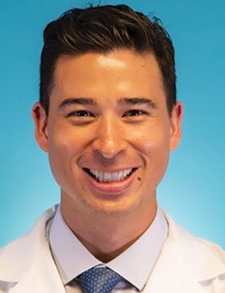
Matthew Shew, MD – Assistant professor of otology and neurotology, department of otolaryngology–head and neck surgery, Washington School of Medicine, St. Louis, Mo.
Dr. Matthew Shew earned his medical degree from the University of Indiana School of Medicine in 2014, completed his residency at the University of Kansas in 2019, and earned his fellowship in neurotology at Washington University in St. Louis in 2021. Dr. Shew currently sees patients at two Ear, Nose & Throat Center locations, at the Center for Advanced Medicine in St. Louis, and at Barnes-Jewish West County Hospital in Creve Coeur, Mo.
Explore This Issue
August 2024Q: How has your career path diverged from the plans you made in residency?
I think the biggest divergence and change has been where my research has taken me. I always knew that I wanted research to be a central part of my career, but I wasn’t sure exactly how that would take shape. Over time, I’ve learned the importance of being open to opportunities and approaching my career with an open mind, which has allowed it to develop organically and has led me down clinical paths I hadn’t initially considered and led to unexpected opportunities that have significantly advanced my development and career.
Q: What factors do you feel have made you successful?
First would be the foundational technical and clinical skills I developed during my residency and fellowship, which now allow me to make informed and confident decisions. I owe a great deal to the faculty and mentors whose advice and wisdom have been pillars of my early success and whose voices are always in the back of my head—whether I want them there or not!
Second, having a strong support system and collaborative culture at my first job has been instrumental. My talented and insightful faculty partners are always open to providing valuable feedback and offering insights on even the smallest things. Being able to discuss challenging cases at the skull base tumor board, for example, has helped me to adapt to and navigate the complexities of clinical practice.
Third, a mindset of lifelong learning has also been key. Our field is constantly evolving, and staying updated on the latest research and advancements has enabled me to adapt and provide the best patient care I can.
Q: Have you had a strong mentor in your career?
I’ve had several mentors and chairs who have been pivotal in my development. Maintaining relationships from residency training, fellowship, and junior faculty partnerships is critical. It has been incredibly helpful to seek advice from faculty who are at various stages of their careers or pursuing different academic paths, and even from across different specialties.
Q: What advice do you have for residents negotiating their first contract for an academic-based practice?
Understand that many aspects of your contract in academic medicine are non-negotiable and often follow a standard template based on your institution. However, there are several key areas where your chair can provide support and negotiate on your behalf to help you succeed as an academic physician. Therefore, whatever your goals, it’s essential that your chair shares and supports your academic vision. This alignment is crucial for them to leverage their position to help you achieve your career goals. If you have a clearly lined-out plan, budget, and execution strategy targeted to your academic niche, you’re likely to get much more out of any negotiations.
It’s also important to evaluate the institution’s resources. Look for a job offer from an institution that provides the support you need, including research facilities, funding opportunities, and a collaborative environment. Assess the department’s culture, current collaborations, and history of promoting junior faculty with ambitions similar to yours. Lastly, seek guidance from mentors with experience in academic medicine. They can provide valuable insights and different views into what to look for in a job offer and how to negotiate effectively.